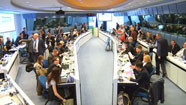On 5 April 2016 the JRC presented the interactive and collaborative online European Energy Efficiency Platform. This beta platform is conceived to fill the gap opened by scattered data and fragmented knowledge resulting from a rapidly growing energy efficiency market. It is expected to be both a one-stop shop for information retrieval and a meeting point for experts to exchange data and reduce redundant activities.
Trends in Energy Consumption and Energy Efficiency 2000 - 2012
This report aims at showing the present status of energy consumption in EU-28, in the four main energy consuming sectors : Residential, tertiary, transport and industry. During the last years, there have been efforts by the European Union to cut down on energy consumption and improve energy efficiency. From 2000-2012, there have been various initiatives that aim at reducing final energy consumption. Therefore the report demonstrates the energy consumption progress from 2000-2012 in the four sectors. Besides the final energy consumption, electricity and gas consumption are analysed, as they are the most important alternatives to oil. The report consists of five chapters. The first chapter compares data for gross and final energy consumption. This comparison gives insights about energy consumption/losses that take place before the delivery of energy for the final end use. Chapter 2 analyses the final energy consumption in the residential sector. A special focus is given in this sector, because many policies have been implemented here. The analysis includes consumption drivers such as economic growth, population, heating demand, household characteristics and energy prices. Chapter 3 focuses on the tertiary sector and gives an overview of the energy consumption changes. Chapter 4 analyses the transport sector with a focus on the road sector. Last, chapter 5 gives an overview of the main changes in the industry sector in the energy consumption and production output.





To quote this publication use the follonwing format: